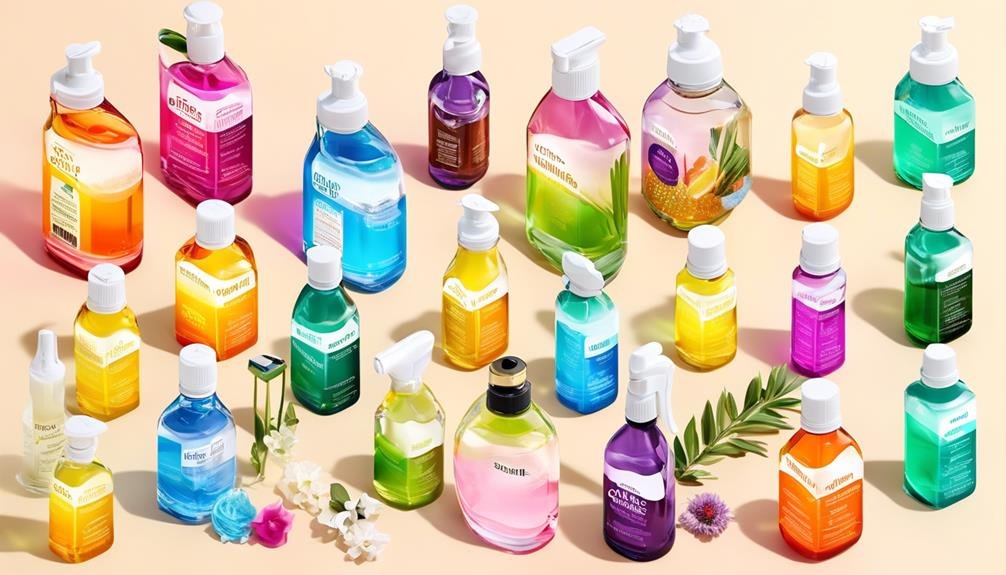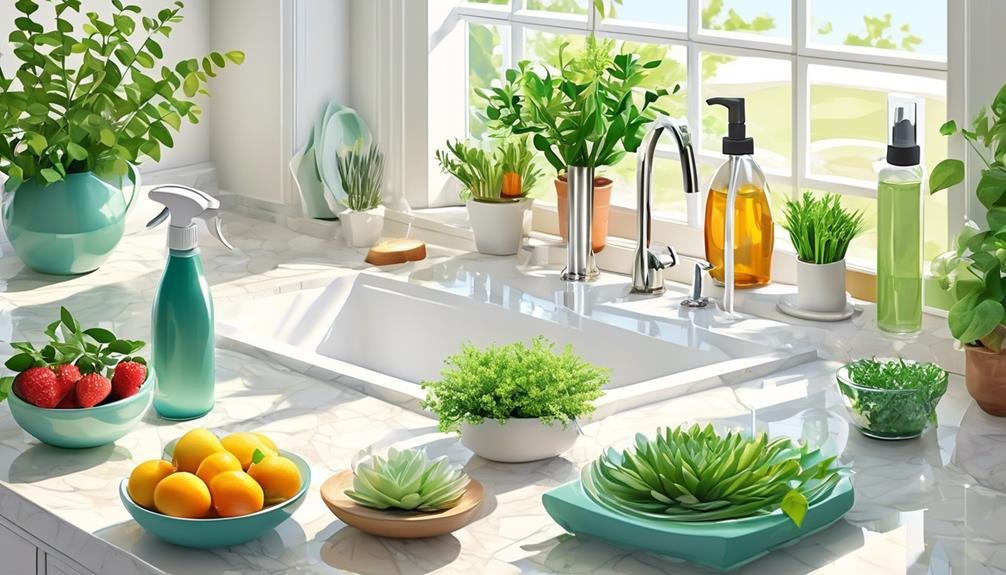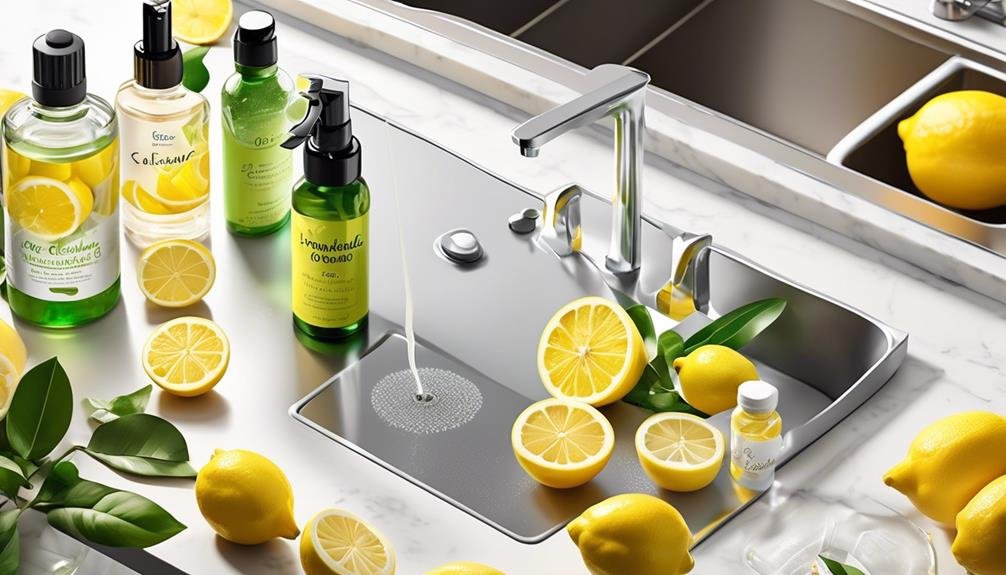Imagine a world where every corner of your home glistens with cleanliness, without the hefty price tag or exposure to harsh chemicals. Making your own DIY cleaning products can be the answer you've been searching for.
But why should you even bother? Well, let's just say that the benefits go far beyond just a sparkling clean house. From taking control over the ingredients you use to the environmental friendliness of your choices, the advantages of DIY cleaning products are numerous.
But we won't spoil it all for you just yet. So, why don't you stick around and discover the compelling reasons why making your own cleaning products might just be the game-changer you've been waiting for?
Key Takeaways
- Making your own DIY cleaning products can save you money and promote environmental friendliness by reducing the need for expensive commercial cleaning products and minimizing plastic waste.
- DIY cleaning products give you control over the ingredients used, allowing you to avoid harsh chemicals and customize your cleaning solutions based on your specific needs and preferences.
- Using natural and non-toxic ingredients in DIY cleaning products can reduce the risk of health issues and minimize pollution.
- DIY cleaning products can be tailored to target specific cleaning needs, with customizable scents, strengths, and effectiveness on various surfaces and materials.
Cost Savings
Using DIY cleaning products can lead to significant cost savings in your household budget. By making your own cleaning solutions at home, you can eliminate the need to purchase expensive commercial cleaning products. Many common household items, such as vinegar, baking soda, and lemon juice, can be used to create effective and safe cleaning solutions. These ingredients are readily available and affordable, making them a cost-effective alternative to store-bought products.
Research has shown that DIY cleaning products can be just as effective as their commercial counterparts, if not more so. For example, vinegar is a versatile and powerful cleaning agent that can be used to remove stains, eliminate odors, and disinfect surfaces. Baking soda, on the other hand, is a mild abrasive that can be used to scrub away dirt and grime. Lemon juice is a natural bleach and deodorizer, perfect for freshening up your home.
Not only are DIY cleaning products cost-effective, but they're also environmentally friendly. Commercial cleaning products often contain harsh chemicals that can be harmful to both your health and the environment. By making your own cleaning solutions, you can avoid these harmful chemicals and reduce your carbon footprint.
Control Over Ingredients
You have complete control over the ingredients used in DIY cleaning products, allowing you to tailor them to your specific needs and preferences. This level of control is one of the major advantages of making your own cleaning products. Unlike commercial cleaning products that often contain harsh chemicals and artificial fragrances, DIY cleaning products can be made using natural and environmentally friendly ingredients.
By using natural ingredients, you can ensure that your cleaning products are safe for both your health and the environment. For example, if you have sensitive skin or allergies, you can avoid using ingredients that may cause irritation or adverse reactions. You can also avoid using chemicals that are known to be harmful to the environment, such as phosphates or chlorine bleach.
To further illustrate the benefits of control over ingredients in DIY cleaning products, consider the following table:
| Ingredient | Purpose |
|---|---|
| Baking soda | Abrasive |
| Vinegar | Disinfectant |
| Lemon juice | Degreaser |
| Essential oils | Fragrance |
This table highlights how different ingredients can be used for specific purposes, allowing you to customize your cleaning products based on your cleaning needs and personal preferences. With control over ingredients, you have the power to create cleaning products that are effective, safe, and tailored to your specific requirements.
Customizable Solutions

The ability to customize your own cleaning solutions is a key advantage of DIY cleaning products. With DIY cleaning products, you have the flexibility to tailor the cleaning solutions to suit your specific needs. Here are three ways in which DIY cleaning solutions can be customized:
- Scent: One of the benefits of making your own cleaning products is the freedom to choose your preferred scent. Whether you prefer the fresh aroma of lemon, the soothing scent of lavender, or the invigorating smell of peppermint, you can add essential oils to your DIY cleaning solutions to create the desired fragrance.
- Strength: DIY cleaning products allow you to adjust the strength of the solution based on the cleaning task at hand. For tougher stains and grime, you can increase the concentration of certain ingredients, such as vinegar or baking soda, to boost the cleaning power. Conversely, for more delicate surfaces, you can dilute the solution to avoid any potential damage.
- Specificity: Another advantage of DIY cleaning products is the ability to target specific cleaning needs. Different surfaces and materials require different cleaning approaches. By customizing your cleaning solutions, you can create formulas that are specifically designed to tackle stains on carpets, grease on kitchen countertops, or soap scum in the bathroom.
Reduced Exposure to Harsh Chemicals
With the ability to customize DIY cleaning solutions, you can reduce your exposure to harsh chemicals commonly found in commercial cleaning products. Many commercial cleaning products contain harsh chemicals that can be harmful to your health and the environment. These chemicals, such as ammonia, chlorine bleach, and phosphates, can cause respiratory problems, skin irritation, and even contribute to air and water pollution.
By making your own DIY cleaning products, you have full control over the ingredients used. You can choose natural and non-toxic alternatives that are effective in cleaning without the use of harsh chemicals. For example, you can use ingredients such as vinegar, baking soda, lemon juice, and essential oils to create cleaning solutions that are safe and environmentally friendly.
Research has shown that certain chemicals commonly found in commercial cleaning products can have long-term health effects. For instance, some chemicals have been linked to allergies, asthma, hormone disruption, and even cancer. By reducing your exposure to these chemicals, you can decrease the risk of developing such health conditions.
Furthermore, using DIY cleaning products can also benefit the environment. Harsh chemicals from commercial cleaning products can contaminate waterways, harm aquatic life, and contribute to air pollution. By using natural and non-toxic ingredients, you aren't only protecting yourself but also helping to preserve the environment.
Environmental Friendliness

Using DIY cleaning products promotes environmental friendliness by reducing the use of harmful chemicals and minimizing pollution. By making your own cleaning solutions at home, you can contribute to a healthier environment in the following ways:
- Reduced chemical pollution: DIY cleaning products often rely on natural ingredients such as vinegar, baking soda, and lemon juice, which are less toxic and have minimal impact on the environment when compared to commercial cleaning products. By avoiding the use of harsh chemicals like ammonia and chlorine, you can help reduce chemical pollution in waterways and minimize the release of volatile organic compounds (VOCs) into the air.
- Decreased plastic waste: Many store-bought cleaning products come packaged in single-use plastic containers, contributing to the global plastic waste problem. By making your own cleaning solutions, you can store them in reusable containers, reducing your reliance on disposable plastic packaging and helping to alleviate the burden on landfills and oceans.
- Sustainable sourcing: DIY cleaning products often involve using ingredients that are readily available in your pantry or can be easily obtained in bulk. By opting for natural ingredients and minimizing the use of commercially produced cleaning agents, you can contribute to sustainable sourcing practices and reduce the carbon footprint associated with the production and transportation of cleaning products.
Versatility
DIY cleaning products offer a versatile solution for various cleaning needs, allowing you to customize your cleaning solutions to suit different surfaces and materials.
One of the key benefits of making your own cleaning products is that you have the flexibility to adjust the ingredients and proportions to meet specific cleaning requirements. For example, if you need a stronger solution to tackle tough stains on a hard surface, you can add more vinegar or baking soda to increase the cleaning power. On the other hand, if you're cleaning a delicate material, such as silk or leather, you can reduce the concentration of certain ingredients to prevent damage.
The versatility of DIY cleaning products extends beyond adjusting the cleaning solution itself. You can also experiment with different combinations of essential oils to create customized scents for your cleaning products. For instance, you can add lavender essential oil to your homemade fabric freshener to create a calming and relaxing aroma, or use lemon essential oil in your all-purpose cleaner for a refreshing and energizing scent. By having the ability to tailor your cleaning products to your preferences, you can create a more enjoyable cleaning experience while effectively tackling various cleaning tasks.
Moreover, the versatility of DIY cleaning products allows you to use them on a wide range of surfaces and materials. Commercial cleaning products often come with specific instructions and warnings regarding their usage on certain surfaces. However, with DIY cleaning products, you can have more confidence in their compatibility with different materials. For example, you can safely use a homemade glass cleaner on windows, mirrors, and other glass surfaces without worrying about streaks or damage. Similarly, a homemade wood cleaner can be used on wooden furniture, floors, and cabinets without the risk of discoloration or harmful effects.
Frequently Asked Questions
Are Homemade Cleaning Products as Effective as Store-Bought Cleaners?
Homemade cleaning products can be just as effective as store-bought cleaners. Research shows that ingredients like vinegar, baking soda, and lemon juice have disinfectant properties. Plus, making your own DIY cleaning products can save you money and reduce exposure to harmful chemicals.
What Are Some Common Ingredients Used in DIY Cleaning Products?
Common ingredients used in DIY cleaning products include baking soda, vinegar, lemon juice, hydrogen peroxide, and essential oils. These natural alternatives can effectively clean and disinfect your home without the use of harsh chemicals.
Can Homemade Cleaners Be Used on All Types of Surfaces?
Homemade cleaners are suitable for various surfaces, including glass, countertops, and floors. They offer flexibility and customization, allowing you to tailor the ingredients to specific needs. However, always test on a small, inconspicuous area first to ensure compatibility.
Are There Any Safety Precautions to Consider When Using Homemade Cleaning Products?
Consider safety precautions when using homemade cleaning products. Avoid mixing chemicals, use proper ventilation, wear protective gloves and eyewear, and store products out of reach of children.
How Long Do Homemade Cleaning Products Typically Last Before They Expire?
Homemade cleaning products typically last for about 1-2 months before they expire. However, this can vary depending on the specific ingredients used. It's important to label and store them properly to ensure their effectiveness and safety.
Conclusion
In conclusion, creating your own DIY cleaning products offers numerous benefits.
Not only does it allow for cost savings, but it also gives you control over the ingredients used, ensuring a safer and healthier environment.
Additionally, DIY cleaning solutions can be customized to suit specific cleaning needs, reducing exposure to harsh chemicals.
Furthermore, by using homemade products, you contribute to environmental friendliness and promote versatility in cleaning routines.
Overall, embracing DIY cleaning products is a practical and sustainable choice.






